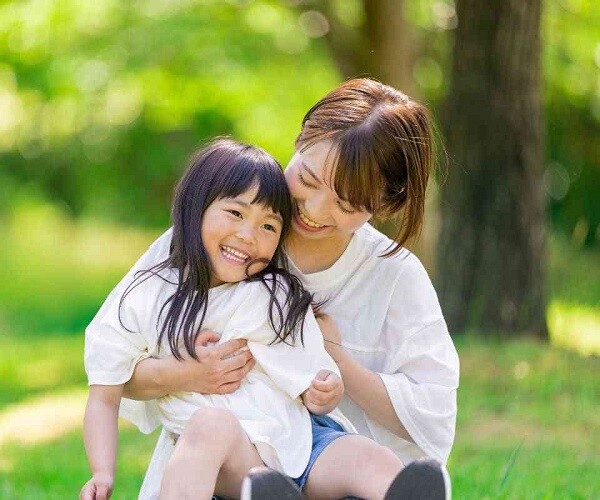It’s important for parents to teach children that their self-worth comes not only from physical appearance but also from qualities such as intelligence, kindness, empathy, and more.
Kindness is the foundation of all relationships. When children know how to treat others well, they will easily make friends and build lasting relationships.

Illustration.
At the same time, when children encounter difficulties, kindness will help them find solutions and support others, thereby creating a positive environment around them.
Parents and adults need to demonstrate kindness through small daily actions, such as helping others, listening, and showing concern. It is also important to teach children how to communicate positively with others, avoiding a sole focus on physical appearance.
When children understand the value of kindness, it becomes easier to nurture generations that are loving, empathetic, and positive, thus creating a brighter future.
 Psychologist Quang Thi Mong Chi.
Psychologist Quang Thi Mong Chi.

Many parents nowadays tend to enter their children into beauty pageants: teaching them to dance, catwalk, take artistic photos, or dress fashionably from a young age. How will this affect children’s perception of themselves and others (both positively and negatively)?
In recent years, many parents have entered their children into beauty pageants or focused heavily on their physical appearance by teaching them to dance, catwalk, take artistic photos, or dress fashionably from a young age. While these activities can provide some positive benefits, such as improving self-expression, building confidence in front of crowds, and fostering personal image and self-care awareness, it is important not to overemphasize physical appearance.
When appearance becomes the primary measure of a person’s worth, it can lead to significant psychological issues. Children growing up in an environment that overly emphasizes physical appearance may develop a distorted perception that outward beauty is the most important factor in determining self-worth. This can lead to low self-esteem if they feel their appearance falls short of expectations or constant pressure to maintain a “perfect” image in the eyes of others.
Frequent participation in beauty contests and fashion shoots can also encourage children to constantly compare themselves to others, leading to body image issues, low self-esteem, and even eating disorders or weight obsessions later in life.
Moreover, an exclusive focus on outward appearance may cause children to neglect the development of essential inner qualities such as compassion, honesty, a hard-working spirit, and independent thinking skills. These inner qualities are the true foundation for building a strong character and achieving lasting success in life.
Therefore, instead of relying on external validation based on appearance, parents should accompany their children in cultivating positive values. While physical appearance can be an advantage, it is kindness, benevolence, and inner strength that truly shape a person’s value.

Is it true that if parents only focus on their children’s outward appearance and neglect their inner development, their children will likely grow up to be “all show and no substance”? What are your thoughts on this?
The statement that children may become “all show and no substance” if parents only focus on outward appearance and neglect inner development is indeed valid, especially when considering the holistic development of a child’s character. During their formative years, children need nourishment for their physical, mental, and social well-being.
If a child grows up in an environment that solely values physical appearance—whether it be through praise, attention, or opportunities—they may gradually come to believe that their worth is primarily determined by how they look. This can lead to a lack of motivation or effort in developing other essential abilities.
Children raised in such conditions may struggle to face real-life challenges and feel ill-equipped when they can no longer rely solely on their looks. Their confidence may be superficial, lacking the solid foundation that comes from intellectual development, moral character, and the ability to connect with others.
This can not only hinder their ability to adapt to future academic and professional environments but also impact the quality of their personal relationships. They may prioritize superficial glamour over sincerity, empathy, and collaboration. While there is nothing wrong with caring for one’s appearance, it should not become the central focus of development at the expense of inner growth.
Parents have the responsibility to help their children appreciate and care for their outer appearance while also ensuring they develop a strong inner foundation. True confidence comes from a combination of physical, mental, and emotional well-being.

How can fathers teach their children to create value through their intellect, character, and resilience instead of relying on their “beauty halo”?
Fathers can play a crucial role in helping their children understand that their worth is not defined by their “beauty halo” but rather by their intellect, character, and resilience. Here are some effective strategies:
Firstly, fathers should lead by example in their lifestyle and behavior. Children learn by observing, so when they see their father living a life that values substance over form, treating others with kindness, embracing a love for learning, demonstrating responsibility, and upholding integrity, they will naturally understand that a person’s worth stems from their actions and inner qualities rather than external appearances.
For instance, instead of solely praising your child for their physical appearance, acknowledge their efforts in studying, their perseverance in solving problems, or their kindness in helping others. This will help them internalize what truly matters.
Secondly, create opportunities for your child to develop their intellect and social skills through reading, creative pursuits, life skills education, sports participation, and real-world experiences. These activities foster independent thinking, collaboration, communication, and resilience—core elements for navigating life successfully.
Additionally, teaching your child about gratitude, empathy, and responsibility is essential for character-building. When your child learns to share with others, admit and correct their mistakes, and consider the well-being of their community, they are building inner strength that goes beyond superficial appearances.
Lastly, accompany your child on their journey towards self-improvement and encourage them to develop their unique potential, free from comparisons with others. Avoid imposing unrealistic external standards, such as “you must be thin, fair-skinned, or exceptionally attractive to be valuable.” Teach your child that everyone possesses a unique beauty—in their thoughts, actions, and physical appearance. This is the key to raising confident, kind, and resilient individuals.

While physical appearance isn’t everything, it still holds significance in modern life. How should parents teach their children to care for their appearance in a healthy and appropriate manner?
Indeed, while physical appearance isn’t everything, it does play a role in making first impressions, building self-confidence, and showing respect for oneself and others in modern life. Instead of taking an extreme stance against physical appearance, parents should guide their children in caring for their appearance in a healthy and positive way.
Firstly, help your child understand that taking care of their appearance is not about conforming to someone else’s standards or chasing fleeting beauty trends. It’s about maintaining their health, showing self-respect, and taking responsibility for their body.
For example, encourage your child to dress neatly and appropriately for different occasions, maintain personal hygiene, engage in physical activities, and get sufficient rest. These practices contribute to both a healthy appearance and positive psychological development.
Secondly, educate your child about true beauty—it’s not just about a pretty face or an ideal body type, but also about the radiance that comes from a positive attitude, a warm smile, gracious behavior, and a vibrant energy.
By doing so, your child will not feel pressured to achieve an unattainable standard of perfection but will learn to appreciate themselves as a holistic individual, embracing both their inner and outer beauty. Additionally, it is crucial to teach your child to distinguish between self-care and the pursuit of artificial, exaggerated, or morally questionable beauty trends.
Children need to be equipped with the skills to navigate social media messages and choose positive role models instead of falling into the trap of “living a fake life,” heavily edited images, or distorted perceptions of body image and personal value.
In conclusion, rather than imposing strict rules or neglecting the topic, parents should act as supportive guides, helping their children appreciate and care for their appearance as part of their overall development while ensuring that physical appearance does not become the central defining factor of their self-worth. This approach will foster confidence, self-care, humility, benevolence, and a deep sense of inner strength in children as they grow up.
The Face of Fortune: Unveiling the Mark of Destiny
“The essence of one’s fortune truly lies in the habitual actions they perform daily, etching themselves into their very soul and eventually manifesting on their visage. It is a reflection of their innate character and the choices they make, a testament to the power of consistency and self-discipline.”






































